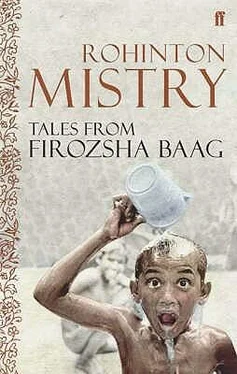Rohinton Mistry - Tales From Firozsha Baag
Здесь есть возможность читать онлайн «Rohinton Mistry - Tales From Firozsha Baag» весь текст электронной книги совершенно бесплатно (целиком полную версию без сокращений). В некоторых случаях можно слушать аудио, скачать через торрент в формате fb2 и присутствует краткое содержание. Год выпуска: 2006, Издательство: Faber & Faber, Жанр: Современная проза, на английском языке. Описание произведения, (предисловие) а так же отзывы посетителей доступны на портале библиотеки ЛибКат.
- Название:Tales From Firozsha Baag
- Автор:
- Издательство:Faber & Faber
- Жанр:
- Год:2006
- ISBN:нет данных
- Рейтинг книги:3 / 5. Голосов: 1
-
Избранное:Добавить в избранное
- Отзывы:
-
Ваша оценка:
- 60
- 1
- 2
- 3
- 4
- 5
Tales From Firozsha Baag: краткое содержание, описание и аннотация
Предлагаем к чтению аннотацию, описание, краткое содержание или предисловие (зависит от того, что написал сам автор книги «Tales From Firozsha Baag»). Если вы не нашли необходимую информацию о книге — напишите в комментариях, мы постараемся отыскать её.
Tales From Firozsha Baag — читать онлайн бесплатно полную книгу (весь текст) целиком
Ниже представлен текст книги, разбитый по страницам. Система сохранения места последней прочитанной страницы, позволяет с удобством читать онлайн бесплатно книгу «Tales From Firozsha Baag», без необходимости каждый раз заново искать на чём Вы остановились. Поставьте закладку, и сможете в любой момент перейти на страницу, на которой закончили чтение.
Интервал:
Закладка:
Trying to conceal the rough edge of resentment that crept into his voice now, he was only partly successful. “You keep saying the girl, the girl, the girl. You know her name is Behroze, why don’t you use it? Do you think if you pronounce her name she will become more real than she is?”
His parents shifted uncomfortably. “You never talk to us these days,” said Mother. “You were not like that in school. How you used to come home and tell me everything. The little butter we could afford I would always save for you, make your tea, help with homework. And how you used to go running to Dr. Mody every Sunday at ten o’clock, do you remember, with your stamps.” Those happy years brought a wistful smile to her face. She reached out as if to stroke his cheek. But the memories also exacerbated the imperfection of the present, and she left the gesture unfinished.
“We never treated you like other parents when you misbehaved. That old Karani woman in B Block, she used to make her boy stand naked out on the steps for punishment, to shame him. A brilliant CA he is now, but to this day the poor man has not completely recovered from that cruelty. And Dr. Mody, rest his soul, would slap his son Pesi left-right on the face. Outside in the compound for all Firozsha Baag to see.” Mother paused, remembered the point she was trying to make, and continued.
“Maybe it is because you have changed so much that we fret. You used to care about our problems, worry just like Daddy and me. More and more selfish you seem to be now, so what am I to think? That your new life in college, and your new friends, and that girl — Behroze — have changed you.”
“Again we are starting to argue. No use talking of it now,” said Father, “when we are all so tired.”
“But I want to tell you what I think,” said Jehangir. “Bhagwan Baba talked about a trap. He also said no one can do anything about it. No one means not you or I or Bhagwan Baba himself. So what is the point of a warning no one can act upon?”
“You see what I mean?” asked Mother, turning in despair to Father. “What I mean when I say he has changed? He takes all these logic and philosophy courses in college and gives us smart answers. We begged and borrowed to pay his college fees, and this is the result. Not afraid even to twist the words of Bhagwan Baba. Don’t forget, all your smartness and your ambition to go to America will come to nothing. This girl will change you and keep you here. Then you will finish your days like your father and me, in poverty and filth.”
The suburban local to Bombay Central was announced over the loudspeaker. As the train swept in, Mother realized that the brown paper bag of oranges blessed by Bhagwan Baba was missing. Jehangir raced into the waiting-room and back to the compartment where they had found seats.
“You can eat one every day for the next three days,” Mother said. “It will help you think clearly about your problem.”
Jehangir did not tell Behroze about Bhagwan Baba. She would dismiss him as a fake, lumping him in the same category as the quacks and charlatans of whom there was no dearth in Bombay, who sold their charms and potions and had a thriving trade among the educated and the uneducated alike. It would lead to an argument, and he did not want to have to defend Bhagwan Baba.
That week, he missed choir practice and went to the Hanging Gardens. He walked, taking the short cut up the hill as he had done so many times with her. He mulled over the words of Bhagwan Baba. Not that it matters one way or the other what he meant, he kept assuring himself. A trap, he had said. Did he mean Behroze trapped me? That was absurd. Why would she want to? If anything, he had trapped Behroze, luring her with his melancholy looks and the sad and gentle air which so became him and his shyness. Or had Bhagwan Baba meant trap in a larger — sort of cosmic — sense, so that he and his parents and Behroze were all trapped, and must work out their lives within its confines? This interpretation at least had some metaphysical appeal to it.
The sun was on the verge of setting when he arrived at the Gardens. There was yet another possibility: that he could not break with Behroze even if he wanted because these things were out of man’s control. Ludicrous, the thought that he was seeing her impelled by some higher force.
On weekdays the Gardens were empty except for ayahs with their charges and the elderly out for a constitutional. They left when it got dark. Then couples arrived to seek privacy behind bushes and trees. But shortly after dusk a gang of men roamed through the Gardens, flushing out twosomes in their sanctuaries. They would stand around and snicker, or yell out obscene encouragement punctuated by lewd flourishes of hands and fingers, till the couples took flight in frustration and embarrassment.
Jehangir walked till the sun went down. The ayahs and the little children departed with their prams and toys, and across the greying skies a flock of sparrows ushered them to the exits, chirping urgently. He could go on seeing Behroze as if nothing had changed. But then the squabbles, the scenes verging on hysteria, the bitter taunting would continue to fester. In one way Bhagwan Baba’s words made sense; life is a trap — I cannot solve both problems. How long could such terrible discord persist without rupturing something vital? He never understood that so much unhappiness could come upon the happy, loving family they used to be. A horrible end would come of it, some awful mess, if things continued in their clamorous, disturbed manner.
He emerged from the Gardens through the gate opposite the one he had entered by. Where the shik-kababwalla sat. Fanning his coals, and the skewers ready in his basket, loaded with bits of beef and liver. Nodding at Jehangir in recognition. Then across the road and into Kamala Nehru Park, with its hedges sculpted into the shapes of animals and birds. In bright sunlight, when freshly trimmed, the figures were delightful to look at. But now the hour was passing through the final moments of dusk, and the shapes were indefinable. Looming in a strange, unearthly manner. Possessing neither the randomness of nature nor the manicured discipline imposed by man.
He left quickly. Something eerie about the place. Back into the Hanging Gardens, to retrace his steps homeward, down the hill.
And then a slight detour occurred to him, through the children’s playground. His heart raced a little as he approached, wondering if the exercisers would be there.
He heard their panting before he saw them, and hurried to turn the bend in the hedge and position himself at his old place. Unnoticed, he watched their sweating bodies perform. The old fascination returned at the sight of their rippling, bulging muscles. In their rhythm and symmetry, in the sureness of their pulse, in the obedient responses of their limbs he rediscovered what he had always found strangely enticing, and remembered the days in the gym at St. Xavier’s: the smell of sweat, the camaraderie that flowed, the slapping of flesh, the search for the hairiest chest, bushiest armpit, longest pubic hair, the grabbing and jostling, all the fun which he was never a part of, always ignored by the boys, always isolated.
And now, regarding these fellows building bodies by night, a wild urge came over him. To step out of his concealed spot and touch their muscles, feel the hardness, make his body join theirs in the exercises. To engage in good-hearted physical competition, to see who could do the most push-ups, to arm-wrestle, to grunt and heave together.
But it was only momentary. I was never good at such things, I’ll look foolish. He laughed at himself and left, feeling better now. As if the straining, exerting muscles of these men at exercise had kneaded away the disquietude and anxiety he had been feeling about Behroze, about Bhagwan Baba, about his parents. Nothing is a trap, I exercise control over my own destiny.
Читать дальшеИнтервал:
Закладка:
Похожие книги на «Tales From Firozsha Baag»
Представляем Вашему вниманию похожие книги на «Tales From Firozsha Baag» списком для выбора. Мы отобрали схожую по названию и смыслу литературу в надежде предоставить читателям больше вариантов отыскать новые, интересные, ещё непрочитанные произведения.
Обсуждение, отзывы о книге «Tales From Firozsha Baag» и просто собственные мнения читателей. Оставьте ваши комментарии, напишите, что Вы думаете о произведении, его смысле или главных героях. Укажите что конкретно понравилось, а что нет, и почему Вы так считаете.












